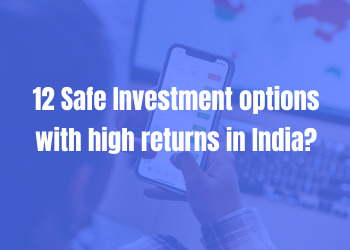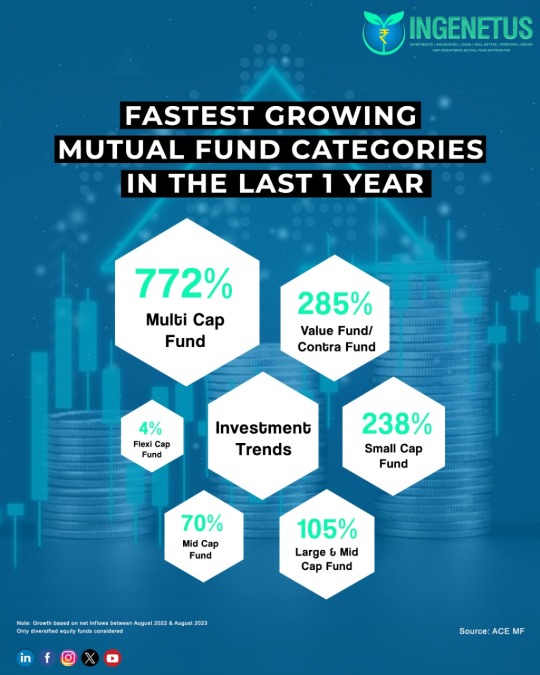#Mutual fund investment
Link

Most of us always tend to get confused when it comes to investing in Mutual funds. But the fact check is that investing in Mutual Funds is always the safest investment if you are looking our for long term or from beginners perspectives. Check out more at https://lakshmishree.com/mutual-fund.
#mutual fund#mutual fund investment#mutual fund investment calculator#mutual fund companies in india#mutual fund sip calculator
3 notes
·
View notes
Text
Which Loan is Best, FD, Gold Loan, Mutual Fund, Personal Loan
What is Loan

Some Types of Loans
FD (Fixed Deposit) Loan
You can take a loan against bank FD without breaking it. In this way, along with the benefit of maintaining the savings deposited in the bank, one also gets the necessary cash.
The interest rates (12–15%) applicable on FD loans are also lower than personal loans. This loan is also easily available immediately. Also, there is no need to submit many documents to the bank for this. Savings also remain intact along with debt.
Gold Loan
Gold loans have become attractive these days as gold prices have reached Rs 75,000 per 10 grams. Now you will get more loan than before on mortgaging jewellery.
READ MORE>>>>
#which loan is best#Which loan is best in india#Which Bank is best for personal loan with low interest#Which loan is best for bad credit#FD LOAN#Personal Loan#Gold Loan#Mutual Fund#HDFC Personal Loan#Personal loan rate of interest#Personal loan calculator#interest rate#Fd loan sbi#Gold Loan interest rates#Gold loan Calculator#Gold Loan SBI#Mutual fund calculator#Mutual funds India#SBI Mutual Fund#Mutual fund investment#4 types of mutual funds#Mutual Fund Sahi Hai#HDFC Mutual Fund#Mutual Fund investment Plan#SBI Gold Loan interest rate#Gold loan per gram#Gold loan EMI calculator#Gold loan near me#IIFL gold loan#Fd loan calculator
0 notes
Text
12 Safe Investment options with high returns in India?

Investment plans typically assist you in achieving your life goals if you select them by your financial plan. Regardless of your financial goal’s duration, take your financial milestones into account while selecting a plan.
Let’s have a look at the best Indian investment opportunities listed below.
Direct Equity- Stocks: For investors who are willing to take risks, direct equity stocks are among the greatest choices. Direct equity investment is the process of purchasing listed equity equities of businesses on stock exchanges. Direct stock investments can yield either dividends or capital gains. Stock performance is influenced by a variety of factors, including firm success and market position.
A. This option has a high risk-return ratio and is among the most volatile investments.
B. Among the greatest ways to invest money to grow wealth adjusted for inflation
C. appropriate for a lengthy time frame
Having both a bank account and a Demat account is necessary to begin investing in this. A high-risk appetite is also necessary if you wish to continually invest in stocks and profit from them. Before beginning an investment, familiarize yourself with how equity stocks and markets operate.
2. Equity Mutual Funds: The main asset class of equity mutual funds is equity stocks and related instruments. These are among the greatest investment choices available in India for little individuals hoping to gain from the expansion of the equity market. With equities mutual funds, you can begin investing with as little as Rs 500 to start building well-diversified portfolios of equity companies.
Between 70 and 95 percent of the fund value may be allocated to equities stocks and similar securities by these funds. Due to their equity basis, these provide a high ratio of risk to return. Mutual funds that offer equity often fall into two categories:
a. Actively managed Mutual Fund: The fund manager is quite involved with these kinds of funds. The success of this fund is significantly influenced by the knowledge and skills of the fund management. They do research and analysis before selecting the stocks in which the fund will invest. Passive investment alternatives are seen as less risky than active funds.
b. Passively managed mutual funds: A large role is not played by the fund management in this kind of fund. The fund is predicated on a specific market portfolio or index. As an illustration, consider a fund composed of NIFTY50 stocks, etc. The performance of this fund is determined by the index’s performance.
3. Equity debt Funds: If you want to minimize volatility or don’t have a strong risk appetite, you might want to look into debt mutual funds or bond funds as investment options. These fixed-income instruments are also part of a diversified portfolio.
Debentures, corporate and government bonds, as well as other long-term fixed-income instruments, make up the amount invested in Debt Funds. Funds might have different risk profiles depending on the kind of securities they own in their portfolio. Prior to investing, you should evaluate the risk by looking up the ratings of the assets the fund owns.
If you desire the steadiness of returns with less risk, funds that hold government bonds or highly rated securities are appropriate. Therefore, you may think about debt funds when:
You avoid taking chances.
Relatively fixed returns are what you seek.
The principal’s safety comes first.
Keep in mind that all debt funds will still be subject to interest rate risk.
4. National Pension Scheme: One investing plan backed by the government that can help you protect your retirement is the National Pension System. The Pension Fund Regulatory and Development Authority (PFRDA) is in charge of regulating it.
This assists you in building a substantial retirement fund that you can use. As an investor who works for yourself or is salaried, you can use the NPS retirement account.
Two varieties of NPS accounts exist.
Retirement Account, Tier-I
Level II
The ability to aggressively grow your corpus is the main distinction between NPS and other provident fund investments. It uses an auto-rebalancing strategy to keep your portfolio risk-free as you become older. You can also receive a deduction for your contribution of up to Rs 2 lakhs.
The portfolio mixes you select and the duration of your investment will determine the risk-return on your NPS investment. Therefore, both risk-averse and aggressive investors can benefit from this retirement investment option.
5. Public Provided Funds: When looking for safe investment options to place their money in, PPF is one of the most well-liked and greatest options. The ideal investing plan for successfully reaching your long-term goals is the 15-year plan. The plan, which was first presented as a secure retirement investment option for independent contractors, has gained popularity among long-term investors since it offers:
Tax Effectiveness
Section 80C allows you to deduct up to Rs. 1.5 lakhs. The maturity value is tax-free as well.
Availability of liquid assets
During the first five years of the account, you are able to borrow against the accrued corpus. Partial withdrawals are permitted after five years.
A mix of Risk and Return
low-risk investment with an annual rate of return that is linked to the market.
Investment period
Minimum Investment Period of 15 Years; thereafter, accounts may be extended in 5-year increments.
6. Bank Fixed Deposit: Another well-liked investment choice in India that guarantees the security of your funds and yields consistent returns is a bank fixed deposit. A set rate of interest will be provided for a predetermined period of time when you invest a lump sum amount. You will get the principal amount plus any compound interest accrued during the term when your term expires.
When investing in a bank fixed deposit, take into account the following:
Returns on bank FDs are guaranteed. The principal sum is therefore secure.
Your FD cannot be withdrawn until it matures. You risk paying penalties and missing out on compound interest if you withdraw before the term is up.
These are among India’s most adaptable investing choices. The duration of the investment can range from seven days to ten years.
In a bank savings account, the initial interest rate will be maintained for the duration of the agreement. As a result, your deposit’s return is set until it matures.
The interest can be reinvested or received.
Upon maturity, banks also let you have your FD automatically renewed.
7. Senior Citizen Saving Scheme: The Senior Citizen Savings Scheme, often known as SCSS, is one of the investment choices that assists participants in reaching their retirement objectives by providing a steady stream of income. You can make a lump sum investment in this scheme after reaching 60. It is one of the possibilities for small savings investments. Every quarter, you will be paid a fixed interest amount.
There are two ways to create a SCSS account:
through the post office
Through Bank
Seniors find it to be a very popular investment option because of its attractive and guaranteed returns. As of Q3 FY 2022-23, the rate of returns is 7.6%. There will be a quarterly adjustment to these rates.
Here are some SCSS characteristics to be aware of:
If you are older than sixty, you can invest in it. Those who have participated in the VRS (Voluntary Retirement Scheme) and are above 55 are also eligible to apply.
Rs 1000 is the minimum investment, meaning that you must deposit an amount greater than or equal to Rs 1000.
A maximum of Rs 15 lakh can be invested. This is the maximum amount that you can invest.
Interest is given out on a quarterly basis.
The five-year maturity term has the option to be extended by an additional three years.
8. Unit Linked Insurance Plans: Because it offers both insurance and a channel for investment, a Unit Linked Insurance Plan (ULIP) might be seen as an investment choice. The policyholder pays a portion of the premiums toward the life insurance and another portion toward the funds of their choice. Given that this life insurance plan delivers market-linked returns, a prospective investor should consider the plan’s advantages and disadvantages before making an investment.
A ULIP that provides both market-linked returns and life insurance is Canara HSBC Life Insurance Invest 4G. There are eight fund alternatives available, each with a partial withdrawal option.
9. Real estate Investment: In India, real estate is a wise choice for investors. But typically, it’s a significant financial commitment. Purchasing real estate, including houses, land, and plots, is referred to as investing. One of the finest ways to fight inflation with investments is to do this. You may be able to make both regular and capital gain income by investing in this.
You can generate additional revenue by renting out the building you recently bought. This will guarantee that you receive returns each month in the form of rent. You can sell your property for more money and make a capital gain if it has appreciated in value.
There is a well-known proverb that states that “location, location, location” are the three most crucial factors in real estate. This is the main element that determines whether or not your real estate investment is successful.
Although real estate in a prime location can be pricey, it also has higher potential for appreciation and can fetch a higher rent.
10. RBI Bonds: One of the safest investment alternatives available in India are RBI Bonds. To generate funds for the advancement of various government programs, the Reserve Bank of India, or RBI, issues bonds to the general public. There is a word attached to these bonds. Money is refunded along with interest earned upon maturity.
These bonds are available for purchase from four private banks as well as all twelve national chains. The RBI will give you a certificate of holding in recognition of your debt. Upon maturity, this certificate will serve as evidence.
These are for a period of seven years.
These can be non-cumulative, in which the interest is paid out as a regular income, or cumulative, in which the money is reinvested.
11. Pradhan Mantri Vaya Vandana Yojana: Seniors, particularly individuals 60 years of age and over, have access to investing choices such as the Pradhan Mantri Vaya Vandana Yojana (PMVVY). After sixty years of age, it provides you with a steady source of income.
It has a longer validity period but still offers interest at a rate of 7.4% annually. This is the current interest rate, good through March 31, 2023.
The following are some qualities of PMVVY that could make you think about making this investment:
Pension payable on a quarterly, annual, or monthly basis
It will mature in ten years.
You can invest a maximum of Rs 9250 per month, and a minimum of Rs 1000 is required.
If you have owned this for more than three years, you can use it to offset loans up to a value of 75%.
12. Gold: In India, gold is frequently seen as the best investment choice for safeguarding a family’s legacy. However, purchasing gold as a family heirloom is now nearly impossible due to growing expenses and fees.
Alternatively, you can steadily increase your gold purchasing power over time by using investing choices like Gold ETFs. They are referred to as “paper gold” in general. It includes investments and gold stocks. In contrast to pricey gold, they can be purchased from the stock market based on your financial situation.
This is an Exchange Traded Fund (ETF), which means it is managed passively. It is a reflection of the real gold price movement of the same caliber. The NAV of the ETF will increase in tandem with rising gold rates.
0 notes
Text
#mutual fund investment#mutual funds protection#mutual funds inflation#mutual fund security#secure mutual funds#mutual fund money#market mutual fund#mutual fund of funds
0 notes
Text

SIP Tax Saving: Maximizing Benefits through SIP | Bajaj Finserv Mutual fund
Discover the potential of SIP tax saving to optimize your investments. Learn how Systematic Investment Plans offer tax benefits and secure your future at Bajaj Finserv Mutual Fund.
0 notes
Text
Maximising Your Mutual Fund Investments with SIP Return Calculators
Mutual funds offer a way for individuals to pool their money together and invest in a diversified portfolio of stocks, bonds, or other securities. Managed by professional fund managers, mutual funds can help reduce the risk of investing and provide an easier path to the financial markets for individual investors. This collective investment scheme allows participants to benefit from the inherent advantages of large-scale investing, including reduced transaction costs and enhanced portfolio management. Understanding what is mutual fund and how it operates is crucial for anyone looking to start their investment journey.
To further enhance the benefits of mutual fund investments, many investors turn to Systematic Investment Plans (SIPs). SIPs allow investors to contribute a fixed amount of money into a mutual fund at regular intervals, taking advantage of dollar-cost averaging and the potential for compound interest over time. However, projecting the future value of these investments can be complex due to the variables involved, such as the amount invested, the frequency of investment, the expected rate of return, and the investment period. This is where a sip return calculator becomes an indispensable tool for investors.
This return calculator is an online tool designed to help investors estimate the returns on their SIP investments in mutual funds over a specific period. By inputting details such as the monthly SIP amount, the duration of the SIP, and the expected annual return rate, investors can get a forecast of their investment growth. This calculator simplifies the complex calculations involved in determining compound interest over varying periods, providing investors with a clear picture of how their money could grow. It enables investors to plan their investments more effectively, aligning their investment strategy with their financial goals.
The power of compounding plays a significant role in the growth of SIP investments. With each investment period, the returns earned are reinvested to generate more returns, leading to exponential growth over the long term. This effect is magnified in SIPs due to the regular intervals of investment, which ensure that the investor benefits from both the highs and lows of the market, averaging out the cost of investment.
Using this return calculator allows investors to experiment with different scenarios, adjusting the monthly SIP amount, investment period, and expected rate of return to see how these changes affect the potential outcome of their investment. This can be particularly useful for setting realistic savings goals and timelines, ensuring that investors are on the right track to achieving their financial objectives, whether it’s building a retirement nest egg, saving for a child’s education, or planning for a major purchase.
Individual investors can access the financial markets through mutual funds, which offer diversification and professional management. SIPs help investors improve their investment strategy through regular investing and compounding. This return calculator is essential for investors seeking clarity and confidence in their investments. Understanding investment returns allows investors to make informed decisions that align with their long-term financial goals, maximising mutual fund returns.
#mutual fund investment#sip calculator#sip calculator online#mutual fund sip calculator#sip investment
0 notes
Text
Understanding the Vital Role of a Mutual Fund Advisor in Wealth Management

What Does a Mutual Fund Advisor Do?
At its core, a mutual fund advisor is a financial professional tasked with assisting clients in making informed decisions regarding their investment portfolios, particularly within the realm of mutual funds. These advisors possess in-depth knowledge of various mutual fund options, market trends, and risk management strategies.
Comprehensive Financial Assessment: One of the primary responsibilities of a mutual fund advisor is to conduct a thorough assessment of a client's financial situation, including their goals, risk tolerance, and time horizon. This evaluation serves as the foundation for crafting a personalized wealth management strategy.
Portfolio Construction: Based on the client's financial profile and objectives, the mutual fund advisor designs a diversified portfolio that aligns with their investment preferences and risk appetite. This involves selecting a mix of mutual funds spanning different asset classes, industries, and regions to optimize returns while mitigating risk.
Ongoing Monitoring and Rebalancing: Wealth management is not a one-time endeavor; it requires continual oversight and adjustment. A mutual fund advisor regularly monitors the performance of the client's portfolio, keeping a keen eye on market developments and economic trends. When necessary, they rebalance the portfolio to maintain its desired asset allocation and adapt to changing market conditions.
Financial Education and Guidance: Beyond managing investments, a mutual fund advisor serves as an educator, providing clients with valuable insights into financial concepts, investment strategies, and market dynamics. By fostering a deeper understanding of their financial landscape, advisors empower clients to make informed decisions and navigate turbulent markets with confidence.
The Importance of a Mutual Fund Advisor in Wealth Management
Now, you may wonder, why enlist the services of a mutual fund advisor when there are countless DIY investment options available? The answer lies in the unique value proposition that these professionals bring to the table:
Expertise and Experience: Mutual fund advisors possess specialized knowledge and expertise honed through years of experience in the financial industry. This expertise allows them to identify opportunities, mitigate risks, and optimize investment outcomes for their clients.
Customized Solutions: No two investors are alike, and a one-size-fits-all approach to wealth management simply won't suffice. Mutual fund advisors tailor their recommendations to each client's individual goals, preferences, and circumstances, ensuring that their investment strategy is both effective and personalized.
Emotional Discipline: Emotions often run high in the world of investing, leading to impulsive decisions and irrational behavior. A mutual fund advisor acts as a voice of reason, helping clients maintain discipline and perspective during periods of market volatility. By keeping emotions in check, advisors help prevent costly mistakes that can derail long-term financial plans.
Fiduciary Duty: Many mutual fund advisors operate under a fiduciary standard, meaning they are legally obligated to act in their clients' best interests at all times. This commitment to ethical conduct and transparency instills trust and confidence in the advisor-client relationship, fostering a collaborative partnership built on mutual respect and integrity.
Conclusion
In conclusion, the role of a mutual fund advisor in wealth management is multifaceted and invaluable. From crafting personalized investment strategies to providing ongoing guidance and support, these professionals play a pivotal role in helping individuals achieve their financial aspirations. By leveraging their expertise, experience, and commitment to client success, mutual fund advisors empower investors to navigate the complexities of the financial markets with clarity and confidence. So, whether you're just starting your investment journey or seeking to optimize your existing portfolio, consider partnering with a mutual fund advisor to unlock the full potential of your wealth.
0 notes
Text
Impact of Global Events on Mutual Funds
In the interconnected world of finance, global events often have a profound impact on investment vehicles, including mutual funds. Whether it's a geopolitical conflict, economic recession, pandemic, or significant policy changes, these events can sway market sentiments, influencing the performance of mutual funds.
The Ripple Effect of Global Events on Mutual Funds
Mutual funds pool money from numerous investors to purchase a diversified portfolio of stocks, bonds, or other securities. This diversification is a double-edged sword; it provides protection against the volatility of individual assets but also exposes investors to a wide array of global events that can affect overall fund performance. When investing in mutual funds, especially through mutual funds online, investors must be cognizant of the broader economic and geopolitical landscape.
Market Volatility and Mutual Fund Performance
Global events can lead to increased market volatility. For instance, political instability in a region where a mutual fund has significant investments can lead to rapid declines in asset values. Conversely, positive developments, such as technological breakthroughs or policy reforms, can boost market confidence and fund performance. Investors looking to invest in mutual funds must stay informed about such events to anticipate potential market movements.
Interest Rates and Economic Policies
Monetary policies, especially changes in interest rates by central banks, can have a significant impact on mutual funds. An increase in interest rates generally leads to lower bond prices, affecting mutual funds that hold a substantial portion of fixed-income securities. On the other hand, equity funds may benefit from rate cuts as borrowing becomes cheaper for companies, potentially boosting stock prices. Investors engaging with mutual funds online should monitor these policy shifts closely to adjust their investment strategies accordingly.
Global Economic Trends
Economic indicators such as GDP growth rates, unemployment figures, and inflation can influence mutual fund investments. A robust economic environment might fuel consumer spending and corporate earnings, supporting equity fund growth. Conversely, recessionary trends can dampen fund performance. Investors aiming to invest in mutual funds should analyze these economic trends to better understand potential impacts on their investments.
Role of Technology and Online Platforms
The rise of mutual funds online platforms has made it easier for investors to access real-time information, manage their portfolios, and invest in mutual funds with the click of a button. These platforms offer tools and analytics that can help investors assess the impact of global events on their mutual fund investments, enabling quicker adjustments to their investment strategies.
Mitigating Risks and Enhancing Opportunities
To mitigate risks associated with global events, investors should consider diversifying their mutual fund investments across various sectors, regions, and asset classes. This strategy can help cushion against the impact of adverse events on specific markets. Additionally, staying informed about global trends and leveraging online platforms for timely investments can uncover opportunities that arise from these events.
0 notes
Text
Navigating Financial Success: A Comprehensive Guide to Choosing the Ideal Financial Advisor

Introduction
In the intricate world of personal finance, the expertise of a qualified financial advisor can be the linchpin to achieving your financial goals. This guide aims to provide a thorough understanding of the essential qualities to look for in a financial advisor, delve into the various types of financial advisors and their expertise, and offer practical tips to help you find the best-suited advisor for your financial journey.
I. Critical Qualities in a Financial Advisor
Experience and Credentials
The bedrock of a successful advisory relationship lies in the experience and credentials of your financial advisor. Seek professionals with a proven track record and industry certifications, such as the Certified Financial Planner (CFP) or Chartered Financial Analyst (CFA), demonstrating a commitment to excellence and ongoing professional development.
Fiduciary Responsibility
Ensure your potential advisor operates under a fiduciary duty, legally bound to prioritize your best interests. This commitment establishes a framework of trust and transparency, essential for a fruitful and ethical advisory partnership.
Specialization
Choose an advisor whose specialization aligns with your specific financial goals. Whether it's investment planning, retirement strategies, estate planning, or tax optimization, finding an advisor with expertise in your focus area ensures tailored advice for your unique needs.
Communication Skills
Effective communication is paramount in financial advisory relationships. Look for an advisor who can articulate complex financial concepts clearly and concisely, empowering you to make well-informed decisions about your financial future.
Rapport and Trust
Building a lasting relationship with your advisor requires a foundation of rapport and trust. Select an advisor with whom you feel comfortable discussing your financial aspirations, concerns, and personal circumstances, as trust forms the bedrock of a successful partnership.
II. Types of Financial Advisors and Their Expertise
Investment Advisor
Provides guidance on investment strategies, assisting you in constructing and managing a diversified investment portfolio tailored to your risk tolerance and financial goals.
Certified Financial Planner (CFP)
Offers comprehensive financial planning services, covering areas such as budgeting, insurance, retirement planning, and estate planning, with a holistic approach to your financial well-being.
Retirement Planner
Focuses on creating strategies for a secure retirement, offering advice on pension planning, Social Security optimization, and investment strategies aligned with your retirement goals.
Estate Planner
Assists in creating plans for the orderly distribution of assets upon death, minimizing estate taxes, and ensuring your wishes are carried out.
Tax Advisor
Specializes in optimizing your tax situation, providing guidance on deductions, credits, and strategies to minimize your overall tax liability.
III. Tips for Finding the Best Financial Advisors
Seek Recommendations
Leverage your network for recommendations. Personal referrals offer valuable insights into an advisor's professionalism, reliability, and effectiveness.
Due Diligence
Conduct thorough online research, examining backgrounds, reading client testimonials, and reviewing regulatory filings to ensure the advisor's credibility and ethical standing.
Schedule Consultations
Meet with multiple advisors to evaluate their services, approach, and compatibility with your financial goals. Utilize these meetings to ask pertinent questions and gauge the advisor's understanding of your unique needs.
Affordability
Understand the fee structure of potential advisors and ensure it aligns with your budget. Transparency in fees is crucial for a mutually beneficial and sustainable advisory relationship.
Conclusion
Selecting the right financial advisor is a pivotal step on your journey to financial success. By prioritizing qualities such as experience, fiduciary responsibility, specialization, communication skills, and trust, you can make an informed decision that aligns seamlessly with your unique financial aspirations. With a knowledgeable advisor by your side, you can confidently navigate the intricacies of personal finance and work towards a more secure and prosperous future.
#financial advisor#visa consultancy services#financial consultant#stock market#mutual fund investment#insurance
0 notes
Text

Investing made exciting! Ride the wave of financial success with these skyrocketing equity funds. Whether you're into tech revolutions or global adventures, your portfolio is in for a treat! 🚀
0 notes
Text
#financial literacy#mutual funds#mutual fund investment#investment plans#investment planning#mutual fund planning
1 note
·
View note
Text
Mutual Fund Investment: A Clever Way to Boost Your Portfolio Over Time
Understanding mutual funds can help you start growing wealth. There is an extensive selection of funds catered to your investing goals. Read along!
Silver Bullion Bars Choose From 10-100oz Pure Silver Trusted Bullion Dealer – Buy Now!
Get In Touch
What Is An Investment Company
An investment company is a business that connects securities for clients’ investment funds. It sells open-end funds…

View On WordPress
#best mutual funds#etf#index funds#investment companies#investment product#investments#managed investment fund#mutual fund investment#mutual funds#stocks
1 note
·
View note
Text

Lumpsum Investment Returns Calculator | Bajaj Finserv Asset Management
Plan your investments effectively using the lumpsum Calculator from Bajaj Finserv Asset Management. Estimate potential returns, set goals, & make informed decisions. Visit now & try https://www.bajajamc.com/knowledge-centre/mutual-fund-calculators/lumpsum-calculator
0 notes
Text
SIP Investment: Thinking Of Investing? SIP Can Be The Right Option | Raj Express
If you want to invest money but don't know how and where, SIP (Systematic Investment Plan) is the best option for you. Regardless of your income, starting SIP at the right time can accumulate a substantial amount over 10-20 years. Learn how.
youtube
0 notes